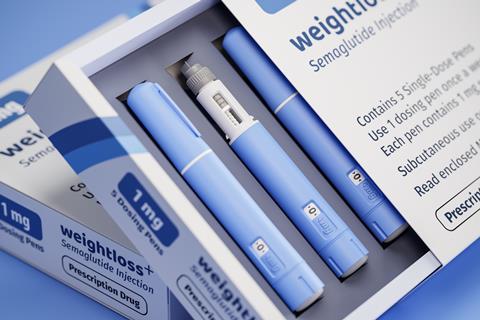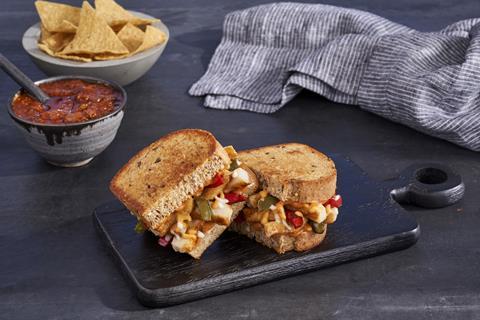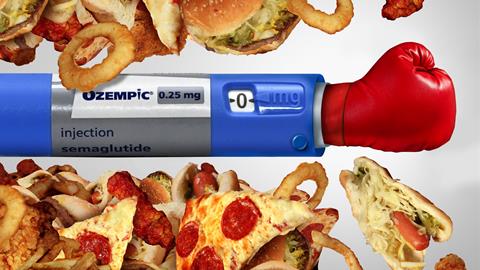If the semaglutide weight-loss jabs making waves in the US catch on here, food ‘cravings’ could become a thing of the past. How are fmcg giants – and their investors – preparing for the ‘revolution’?
Food brands have hardly been subtle in their appeal to indulgence. Pringles had ‘once you pop, you can’t stop’. McDonald’s went with ‘crafted for your craving’. Kellogg’s even named an entire product ‘Krave’. Marketing food as deliciously addictive is a proven winner in sales terms. But what if our cravings became a thing of the past?
A ground-breaking wave of drugs, known widely as Ozempic (although this is, in fact, a diabetes drug) but available in the UK as Wegovy and Mounjaro, is promising just that. These jabs are booming thanks to their ability to eliminate food cravings and suppress appetite.
They typically contain active ingredients like semaglutide, which mimics the naturally occurring hormone glucagon-like peptide 1 (GLP-1) that is released after a meal. The hormone slows digestion, releases insulin to regulate blood sugar and acts on the brain to quell appetite. In essence, patients say the drugs quieten their ‘food noise’.
That’s seemingly bad news for a food industry trying to sell more food, not less. Patients on semaglutide – tried by one in eight Americans – consume up to 30% fewer calories, according to Morgan Stanley. While Britain’s uptake is slightly slower due to ongoing supply issues, a quarter of the population is obese and the drugs are now available on the NHS and in high street stores like Boots. So it may not be far behind.
“This is existential for the many food companies with portfolios anchored in unhealthy foods,” says Henry Dimbleby, author of the UK’s National Food Strategy. He suggests the UK’s semaglutide revolution could eventually outpace the US, given the drug is around 10 times cheaper over here. “I cannot emphasise enough how big a kick this is to the system.”

Preparing for a revolution?
But where some see risk, others sense opportunity. In May, Nestlé became the first major food company to announce an entirely new brand targeted specifically at patients on semaglutide.
Called Vital Pursuit, it will launch in the US later this year and include 12 frozen meals such as protein pasta, sandwich melts and pizzas, all “portion-aligned to a weight-loss medication user’s appetite”.
While most nutritional and ingredient information is still unknown, Nestlé says its meals will be high in protein, fibre and vitamins to help compensate for a restricted diet. “As the use of medications to support weight loss continues to rise, we see an opportunity to serve those consumers,” a Nestlé spokesperson told The Grocer.
The company is understood to have 80 people working on its semaglutide response – a clear sign it’s taking the trend seriously.
“Nestlé is on the money,” says Hamish Renton, MD of food and drink consultants HRA Global. “They’re the first ones to fully grasp the significance of this.”
But obesity experts remain unconvinced. “It’s bizarre,” says Tony Goldstone, associate professor at Imperial College London and an expert on obesity medication. “There’s no specific reformulation a food product needs to be targeted for those on weight-loss medication. It would be the exact same formula for anyone trying to lose weight.”
That formula for weight loss is, unsurprisingly, eating foods that are less energy-dense and lower in fat, sugar and salt. It’s unclear whether Nestlé’s sandwich melts and pizzas will meet these criteria, but based on the limited evidence so far, that might be wise. After all, it seems that not only do semaglutide patients want less food, they might crave healthier food, too. Ozempic and Wegovy manufacturer Novo Nordisk found in a 2017 study, for example, that patients have a “lower relative preference for fatty, energy-dense foods”, while a recent Morgan Stanley survey found 72% claim to eat less Confectionery (see above).
Anecdotal evidence from online groups also supports this view. “The real weird thing for me in the beginning was how much fruit I wanted, but anything containing refined sugar made my mouth feel like it was burning,” said one patient on Reddit.
This poses a potential problem for companies like Nestlé because, as Henry Dimbleby says: “Where do they go? They can try and sell healthy food, but that’s unlikely to make as much money. The other option is to manage a declining business.”
Read more:
-
What the centenarian boom means for supermarket baby aisles
-
How anti-obesity medicines are hitting fmcg shares
-
How ‘miracle’ pills are thriving on TikTok: Healthcare & supplements in 2023
Some companies will simply be hoping the studies are wrong. For now, at least, they’re by no means conclusive. Barclays analyst Andrew Lazar is among those to point out that it’s still ultimately unclear whether certain patients eat more or less junk food. Fast food companies could even be among those to benefit if patients view obesity drugs as “offsetting” such indulgences, he suggests.
Certainly, most large fmcg companies have found it unnecessary to change their portfolios in response. Coca-Cola says it is already developing low-calorie drinks. Danone, meanwhile, insists semaglutide is “complementary” to its existing range – and believes weight-loss drugs might be linked to the jump in demand for its high-protein, low-calorie yoghurts.
Choosing to keep schtum
There’s a reason why many publicly listed companies have been so cautious in their responses. Investors are clearly attuned to even the most minor comment, says Nicholas Fereday, executive director of food and consumer trends at Rabobank.
After all, when Walmart’s US CEO John Furner said last year that obesity drugs led people to buy “less units, slightly less calories”, Mondelez and PepsiCo shares fell 7% and 5% respectively in a matter of days.
“That’s kind of set the tone: Don’t say anything in public, because we do not want that to happen again,” Fereday says.
So most companies are choosing to keep schtum entirely. After all, most of the impact studies so far come from either investment banks or the pharmaceutical giants themselves – hardly the most impartial sources.
“We’re going to have to wait for an announcement from McDonald’s saying: ‘People aren’t buying our burgers,’ before businesses start really showing their hand,” Fereday predicts.
Trepidation isn’t the only cause of silence. Many food execs are simply unconvinced of the threat. While investors panic over lost earnings, most sources The Grocer spoke to insist fmcg boardrooms are relatively sanguine, confident this is nothing but another celebrity-fuelled craze.
They have several reasons to believe it’s all overblown. The first is analyst predictions. They suggest that even if the use of obesity drugs continues to grow, the impact could be limited. Barclays, for example, estimates their widespread use could lead to a fall in sales volumes of just 1.2% for food companies and 3% for Alcohol companies.

“The jury’s still out on how good these drugs really are,” says Marion Nestle, an emeritus professor of nutrition, food studies and public health at New York University. “It’s very unclear how this will play out.”
The second is cost. Despite being considerably cheaper than the US, prices in the UK stand at around £200-plus for one month, which is a hefty bill for patients funding their own treatment. After all, NHS prescriptions for weight-loss jabs remain relatively rare. Semaglutide was included in Nice guidelines for obesity treatment last year but is still offered to only tens of thousands of patients – small fry when considering 64% of the population is overweight or obese, according to government figures.
Then there are potent side effects such as nausea. Alongside the cost, this means many patients do not stay on the drugs for long. One study in the UK, conducted between 2009 and 2017, found 45% stopped within 12 months and 65% within two years.
Once off the drug, suppressed appetites can return quickly. So if patients have lost weight without major lifestyle changes, they may feel hungrier than before, warns Emma Beckett, a senior lecturer in food science and human nutrition at the University of Newcastle.
The final factor is that semaglutide arguably poses few novel challenges to companies like Nestlé. They’re already under pressure from investors to sell more healthy foods; they’re already trying to sell smaller products for more money; and they’re already medicalising many foods under specific claims such as gut health. To all these problems, innovation is, and will likely stay, the answer.

Strategic direction
Even on more structural strategy shifts, there’s an argument that semaglutide does little to change the fundamentals. Nearly all major fmcg companies are already scouring for new areas to combat slumping growth rates in food and drink portfolios.
So even if semaglutide does have an impact, fmcg companies feel they can somewhat rely on plans already in place, says Claire Dannatt, a partner at OC&C Strategy Consultants.
One such plan is expanding into new international markets, she explains, although this has become harder since Russia became off limits and China’s economy hit trouble. India and Brazil are now often framed as the most popular target areas for new growth.
The other is an expansion into new high-growth areas. Unilever, for example, recently acquired supplement and nutrition companies such as Onnit, Nutrafol and Olly Nutrition, while General Mills bought European petfood group Edgard & Cooper, a major player in one of the fastest-growing fmcg categories.
In some cases, the new areas are complementary to the rise of weight-loss jabs. Nestlé, for example, is hoping the semaglutide revolution will enable it to win big in newer innovations like collagen.

The Swiss giant opened the door to collagen in 2020 by acquiring a majority stake in Vital Proteins, the biggest collagen brand in the US. Despite huge investments to make it a mainstream product – including hiring Jennifer Aniston as Vital Proteins’ chief creative officer – it’s failed to take off.
In June, though, Nestlé upped the ante again with a range of supplements for semaglutide users, including hair and collagen supplements to combat ‘Ozempic face’ – a loss of facial fat that leads to sagging skin. It came alongside a new website, GLP-1Nutrition, to sell supplements to patients taking the drugs.
The investor view
Investors, of course, appreciate all these factors, but their method of assessment differs. “Multinational businesses will be thinking in five- to 10-year strategies, while big investors tend to be thinking in 50- to 100-year timelines,” Dannatt explains.
“So, when it comes to possible structural trajectory shifts, even if it’s just a 1% fall in growth, over a 50-year period that creates a big valuation difference.
“Investors are also much faster to price in risk, in case it turns out to be massive. Whereas if you’re doing internal strategy you’d say: ‘Let’s find out more before we panic and start turning our business around.’”
That makes it a tricky balance for fmcg companies to strike. Even if there is little evidence of semaglutide’s impact in the near future – and there are much more pressing problems at play – investors are keen to see action. And in the longer term, the wind is only really blowing in one direction.

For starters, pharmaceutical companies are now throwing everything into new versions of the drug, meaning there’s a good chance their abundance and potency will grow significantly. Studies are also beginning to find patients are at a lower risk of health issues such as dementia, heart attacks and strokes.
Many doctors treating obesity are also in favour of wider usage, so far frustrated by the slow rollout caused by supply shortages. After all, obesity costs the NHS £6.5bn a year, according to government figures – putting the £200 monthly price tag into context. “Our patients are crying out for these drugs. They need them,” says Goldstone at Imperial.
While changes to nutrition and food environments are necessary for obesity prevention, these drugs are a must for treatment, he argues. “People with obesity struggle to maintain a healthy weight without these drugs,” he says. “For decades, people have been trying low-energy diets for weight loss and in general they don’t work because biology kicks in and people regain the weight. These drugs counteract that biology.”
So even if the fmcg giants seem relaxed publicly, behind the scenes it may be a different story. Earlier this year, Novo Nordisk CEO Lars Fruergaard Jørgensen told Bloomberg a couple of food company CEOs had already called asking for advice. “They’re scared,” he claimed.
The message is clear: fmcg giants need to at least prepare for a future in which obesity jabs are a far more commonplace treatment. Otherwise, big pharma may Just Eat their lunch.




















No comments yet